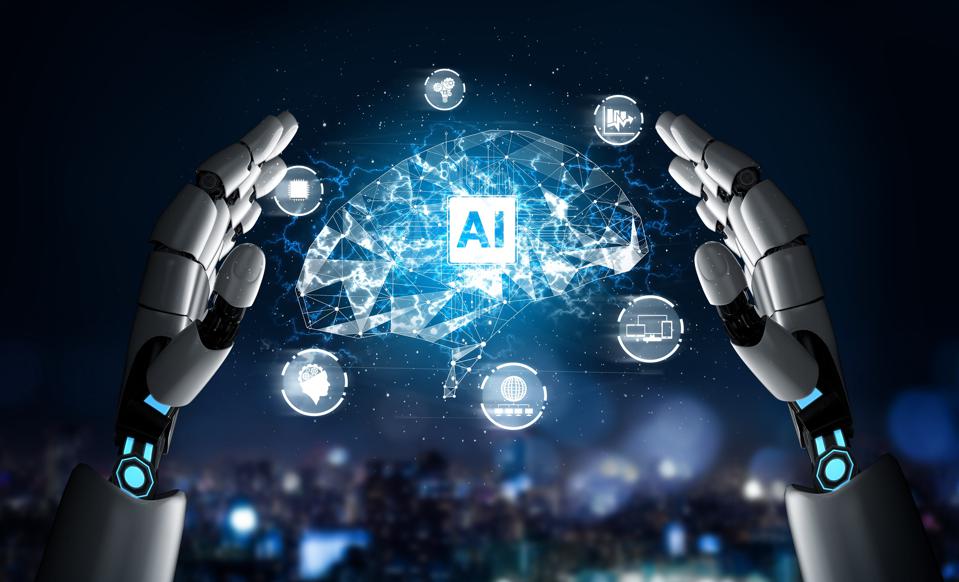Scientists battling Covid-19 have technological tools that were not available during previous pandemics – and among the most significant is artificial intelligence.
This has been used, for example, to design drugs and, in research projects, to predict whether a patient admitted to hospital will require oxygen.
It heralds the likely wider rollout of AI in medicine as the technology becomes increasingly valuable in diagnosing disease, developing prognoses for patients and producing better treatments.
What can AI help with?
Machine learning or AI was used in the early stages of the pandemic by scientists developing vaccines against Covid-19.
It allowed researchers to process vast amounts of data and to identify patterns in them in a way that would not have been possible otherwise.
When designing vaccines, it helped scientists work out which parts of the virus were likely to stimulate an immune response protective against infection.
Similarly, in drug development, it identified which substances could be effective at preventing the coronavirus from replicating.
Among other things, AI has also been useful in determining the prognosis of patients with Covid-19 and in working out how patients might respond to existing drugs.
How can it identify useful drugs?
The potential for AI to highlight drugs that could be used against Covid-19 was illustrated by a study published this year by researchers at the University of Cambridge and other institutions.
They used AI to pinpoint proteins and the biochemical processes that were involved in SARS-CoV-2 infection, which highlighted targets that drugs could act on.
Using AI, the researchers screened nearly 2,000 drugs being used for other conditions and found that about 10 per cent had the potential to be used against the coronavirus.
Of these, 40 were already being tested for their effectiveness against Covid-19 in clinical trials, which, researchers said, indicated that their approach was effective at pinpointing useful drugs.
Can it help doctors who are treating patients?
Numerous studies have shown that AI may become a useful tool for doctors as it can predict, for example, which patients are most likely to deteriorate.
Dr Farah Shamout, an assistant professor of computer engineering at New York University Abu Dhabi, and a team of co-authors released a study in May that looked at this.
Their system, which used the likes of chest X-rays to help forecast what would happen to a patient, was found to offer an accurate prediction of what would happen to a patient over the subsequent 96 hours.
This could be helpful to clinicians as it could indicate which patients need priority in hospitals where there may be limited beds and equipment available.
Have the insights from AI translated into improvements in patient care?
While many studies have used AI during the pandemic, Dr Shamout says the clinical effects may, so far, have been more limited.
“From a research perspective, so many papers came out using AI in relation to Covid-19,” she says. “In terms of whether that goes into practice I’m a bit doubtful. Many of these studies were from small datasets.”
With many pieces of research “internally validated” – checked against data from one institution only – their findings may not be applicable to patients at other institutions.
“Even though the number of papers published was high, I’m not sure if that’s proportional to the impact it’s had in reality,” Dr Shamout says.
What can be done to allow AI to be used more widely in a clinical setting?
If the data used to train algorithms comes from many hospitals, not just a few, the results are likely to have a wider use. However, sharing data from multiple institutions can be difficult because of patient confidentiality rules.
To get around this, researchers in a recent project used federated learning, where data from many sites is combined to train the AI algorithm, even though the data itself is not exchanged.
Published in September, this study from Cambridge University, the healthcare technology company NVIDIA, Massachusetts General Hospital and Harvard Medical School used chest X-rays and other patient data from more than 20 hospitals to train an AI system to forecast the oxygen needs of people with Covid-19.
Called EXAM, the study then tested the AI system in hospitals across the globe and found that it was around 90 per cent accurate.
How could this be used?
The first author of the recent study, Dr Ittai Dayan, a medical doctor and co-founder and chief executive of Rhino Health, a US healthcare AI company, is developing the system further. Other companies are doing similar work to advance AI-based technology in medicine.
Dr Dayan says by the time the system is perfected and ready to be used by physicians, the pandemic might have ended. But the technology could have wide application in the future.
“We will be able to use it in the next pandemic or any other serious public health risk, and do that much, much faster,” he said.
“Tools like federated learning are the picks and shovels needed by developers to research better and more adapted AI.”
AI is likely to be increasingly used in medical care in general, says Dr Dayan, allowing medicine to become “more precise”.
“[Some] people … feel physicians will lose their jobs – I don’t think that’s realistic,” he says. “But physicians will have to become people who can leverage data and leverage AI solutions to be really good at their jobs.”
Updated: October 7th 2021, 3:00 AM



